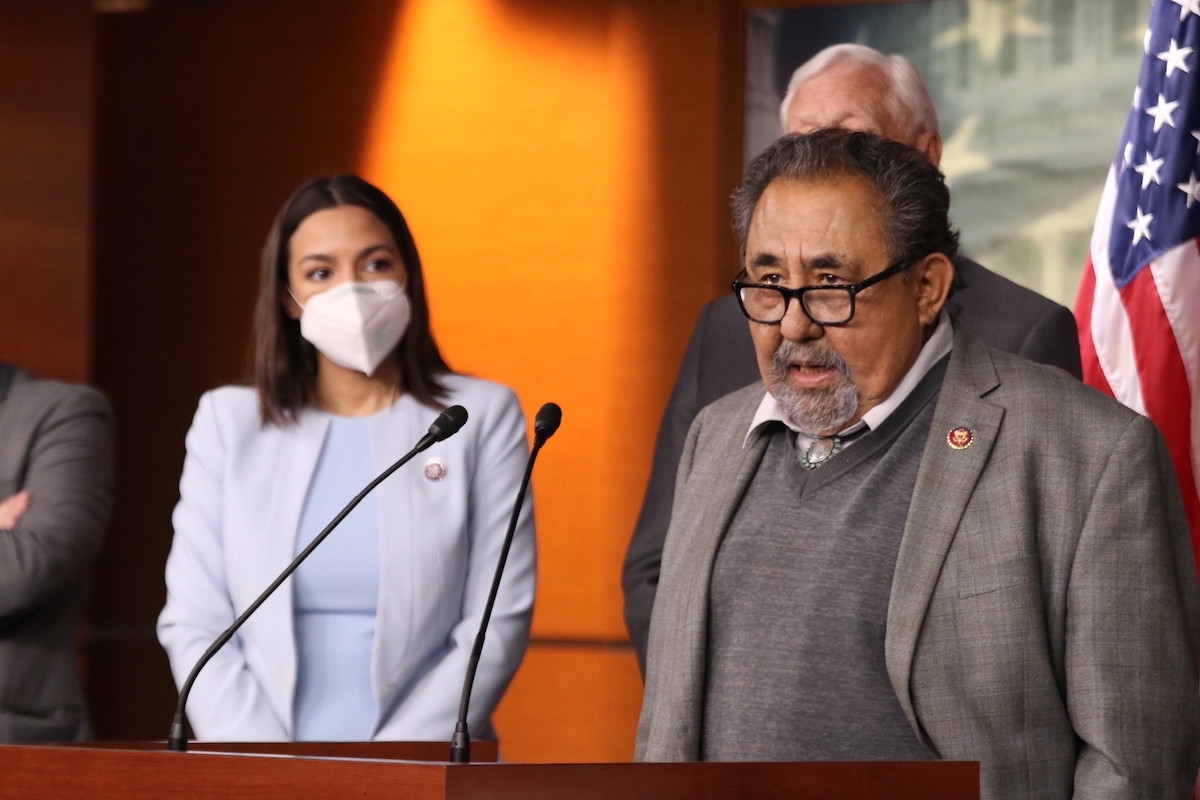

House Committee on Natural Resources Chair Raúl Grijalva (D-AZ) speaks on May 19, 2022 to announce details of the Puerto Rico Status Act. Other attendees included Majority Leader Steny Hoyer (D-MD), Reps. Nydia Velázquez (D-NY), Darren Soto (D-FL), Jenniffer González-Colón (R-PR), Rep. Alexandria Ocasio-Cortez (D-NY), and Puerto Rico Gov. Pedro Pierluisi. (Public Domain)
Last week Thursday, a coalition of Puerto Ricans living in the diaspora sent a letter to Rep. Raúl Grijalva (D-AZ), chair of the House Natural Resources Committee, urging him and other House members for transparency in their proceedings on a draft bill to resolve Puerto Rico’s status.
Erica González, director of Power 4 Puerto Rico, signed the letter and called upon Rep. Grijalva to be clear on whether the committee would host public hearings related to the Puerto Rico Status Act. The committee held a public forum on the island at the beginning of the month but have not held another one since.
The group said steps taken on the draft bill by the House Natural Resources Committee “do not inspire confidence.”
The letter criticized how the public forum was carried out before listing issues with the draft, calling it “rushed.” Among their problems with the content of the bill itself, one of the most glaring was the lack of a Spanish-language version, which the group called a “denial of language rights and unencumbered access to information” and described as projecting a “colonizer-over-colonized terms and conditions for limiting engagement and discussion.”
The committee made a Spanish version of the draft available after the public forum in Puerto Rico, which included several inaccurate translations, thus making the bill still difficult to understand for many Puerto Ricans. Power 4 Puerto Rico said the inaccuracies in translations further attested to their concerns about the process being rushed when it should be “deliberative and thoughtful.”
“Failure to hold extensive, formal public hearings in Spanish —the language of the people directly impacted and who should be at the center of a decolonization process— would further deny Puerto Ricans’ rights to accurate, detailed, and upfront information to determine their future,” the group wrote.
The letter asked if professionals at the University of Puerto Rico were involved in the translation of the draft, and if not, why.
After stressing the crucial role of holding public hearings in the legislative process, the coalition requested that the committee include any “crucial elements” of a status change on the ballot and “not merely part of a subsequent ‘educational campaign.'”
The Puerto Rico Status Act outlines a nonpartisan voter education campaign to be carried out by the elections commission through traditional paid media and made available at all voting locations.
The coalition identified “red flags” and other concerns in the draft in a bullet-point list at the end of the letter, with the disclaimer that the list was previously shared in private with Rep. Grijalva’s staff. The list included issues ranging from counting blank ballots to Puerto Rican diaspora participation in the vote.
Some of the issues outlined in the list were raised by the speakers at the public forum earlier this month. Amongst them were those related to citizenship, including a reference to “statutory citizenship” and ambiguity in language concerning the transmission of U.S. citizenship to a child.
Other issues spoke to the transparency of a realistic timeline for transitioning to another political status. Power 4 Puerto Rico called the draft’s one-year transition into statehood impossible and misleading because it “presents this status option as a quick fix.”
***
Chantal Vaca is a summer correspondent for Futuro Media based in New York City and a graduate of the Columbia University School of Journalism. Twitter: @VacaChantal



[…] Credit: Source link […]
[…] announcement of the bill comes after a coalition of Puerto Ricans living in the Diaspora sent a letter to Rep. Grijalva last month, urging him and his colleagues for transparency in their drafting activities to resolve Puerto […]